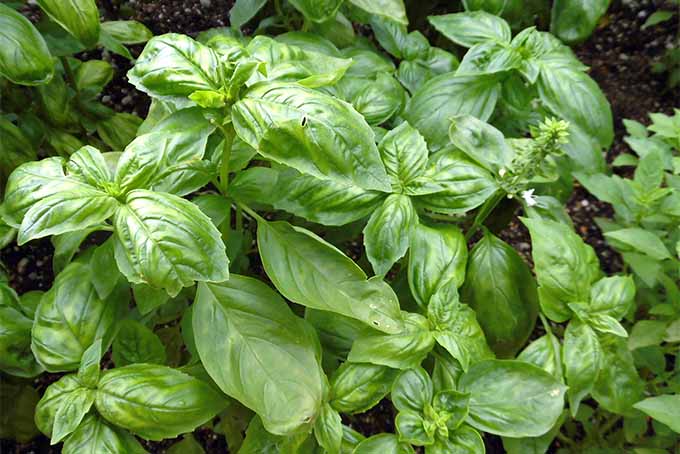The best way to make a plant reach its maximum potential is to give it what it needs. In the case of basil, there is a lot of heat, a lot of sun and a lot of humidity. If you provide them, your basil seedlings will grow quickly to become large plants, providing you with lots of leaves for your pesto.
If you keep your basil in the little pot it went into, you won’t have a large, luxurious plant, even if you regularly provide water and fertilizers. Roots need space to grow, so transplant them to a larger pot or plant them in the garden.
If you grow your plants from seeds, start them early indoors so they are ready to go out when the warm weather comes. Use warm grow lights or heat mats to keep your basil seedlings warm. A constant temperature of 70F is ideal.
Almost all varieties of basil are very tender, so they should not go outside until all risk of frost has passed. As a general rule, the basil should follow the tomato plants. In fact, these two hot season plants have similar cultural requirements. If you have a long growing season, you can sow the basil seeds directly in a well-cultivated place or on a raised bed at the same time as you transplant your tomato plants. By the time the basil seedlings arrive, it will be warm enough for them.
Basil likes a certain amount of moisture in the soil all the time, but doesn’t like wet feet. A rich culture environment makes him happy, but good drainage must be ensured. Work the soil well to ensure good air circulation. Change the garden soil with compost, mold and other organic matter. The compaction of the soil slows growth, so you should aim for “brittle” soil. Add a nitrogen-rich fertilizer that promotes leaf growth. For organic cultivation, vermicompost is excellent. Repeat the feeding every two weeks with compost tea.
Pinch the tip for good branching
Most gardening tips for basil help keep the plant compact and bushy. But larger plants provide more leaves. As you well know, even a small amount of pesto requires a large amount of leaves.
If you want a large basil plant, avoid pinching the tip when the plant is 6 inches tall, as most gardeners advise. Allow the plant to grow quickly and furiously until it is between 12-15 inches tall. Don’t just pinch the apical bud and the first pair of leaves as you normally would. Remove about 2 inches from the tip of the stem. This promotes ramifications from the lower nodes.
The side branches can develop and fill before their ends are pinched. They should be ready within 3 weeks. Continue pinching the tips of all the branches and use them to make pesto and sauces.










